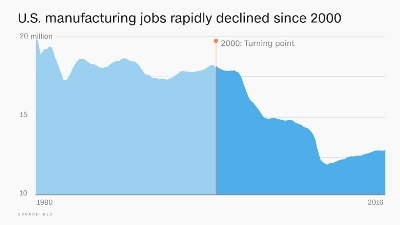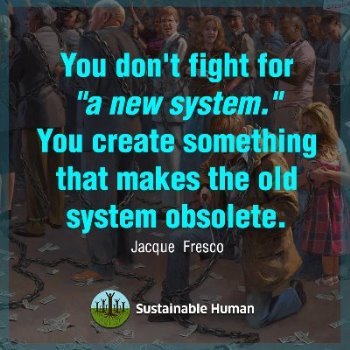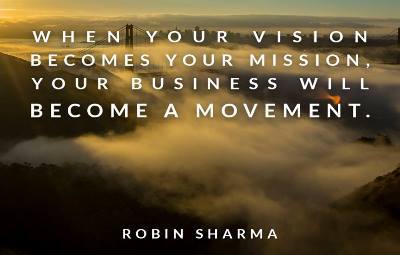Jeremie Averous's Blog, page 56
July 17, 2018
How The Power of Communication and Free Speech of the Fourth Revolution Bears an Intrinsic Contradiction
This interesting speech ‘The First Amendment in the Second Gilded Age – The 2018 Mitchell Lecture‘ addresses the evolution of the theory of Free Speech and the contradiction between the fact that the Collaborative Age technology increases considerably our capabilities of Free Speech at the same time as it empowers much more powerful surveillance.
 Most of the infrastructure we rely on for internet is privately held, and regulations need to exist to ensure that free speech and access is preserved, while privacy is guaranteed.
Most of the infrastructure we rely on for internet is privately held, and regulations need to exist to ensure that free speech and access is preserved, while privacy is guaranteed.
The statutes around Free Speech were developed in a time where most of the media was just broadcasting media. It was difficult to publish and most communication channels were subject to editing. The objective of former Free Speech statutes was to ensure proper information of the public against the media monopoly. Those statutes are thus probably obsolete today and need to be upgraded.
Today, the issue is to guarantee free speech for everyone while managing fake news content and protecting privacy. We have not matured yet the legal statutes to provide those guarantees. It is a great challenge toward the Collaborative Age.

July 14, 2018
How We Should Regulate and Protect Our Genetic Data
Recently the case of the Golden Gate Killer which has been arrested many years later thanks to the availability of a genetic and genealogy website has shown that our genetic data is not quite safe.
 As explained in this paper ‘Here’s the ‘open-source’ genealogy DNA website that helped crack the Golden State Killer case‘, a relative of the suspect underwent a genetic mapping to connect genealogically. Thanks to this public database of thousands of voluntarily uploaded profiles, connections were made to the suspect’s family. It seems that in the US at least there is a trend to get one’s DNA mapped.
As explained in this paper ‘Here’s the ‘open-source’ genealogy DNA website that helped crack the Golden State Killer case‘, a relative of the suspect underwent a genetic mapping to connect genealogically. Thanks to this public database of thousands of voluntarily uploaded profiles, connections were made to the suspect’s family. It seems that in the US at least there is a trend to get one’s DNA mapped.
“The case sheds light on a little known fact: Even if we’ve never spit into a test tube, some of our genetic information may be public — and accessible to law enforcement. That’s because whenever one of our relatives — even distant, distant kin — submits their DNA to a public site hoping to find far-flung relations, some of our data is shared as well.”
I don’t think genetic data protection is enforced through personal data protection laws at this moment, and this issue of closeness of family members’ DNA is also an issue as most of our information is detained by someone else! We may need to regulate the access to our genetic data a bit closer quite soon. Of course, the data should remain accessible by law enforcement through strict supervision by judicial powers, but its availability should be strictly limited.

July 12, 2018
How Manufacturing Jobs Won’t Come Back, and We’d Better Look into Collaborative Age Occupations
There is an increasing number of papers, particularly in the US, on the fact that developed countries lose manufacturing jobs due to globalisation and trade rather than automation, such as this Quartz paper ‘The epic mistake about manufacturing that’s cost Americans millions of jobs‘. This is particularly trendy, of course, in view of the need to justify Donald Trump stance on the need for protectionism.
 My view is that those papers raise an obsolete debate. They are missing the most important point: the economy transforms and the future is not in manufacturing jobs. We’ll never get them back. What’s the point in wishing those jobs to return? Of course in the previous century those were high value added, safe jobs for the middle class. But in the Collaborative Age, manufacturing jobs will become like what farm jobs have become in the Industrial Age: low value jobs.
My view is that those papers raise an obsolete debate. They are missing the most important point: the economy transforms and the future is not in manufacturing jobs. We’ll never get them back. What’s the point in wishing those jobs to return? Of course in the previous century those were high value added, safe jobs for the middle class. But in the Collaborative Age, manufacturing jobs will become like what farm jobs have become in the Industrial Age: low value jobs.
The economy is changing, fast, and it might look like a “manufacturing job implosion” like the paper says. And this is certainly dramatic for many people. But those jobs won’t come back, even with some backward policies around protectionism. Their value is evaporating. Governments should better help people find new, high value added occupations into the Collaborative Age.

July 10, 2018
How Obsolete is Capitalism Really? Can it Really not Address Complexity?
As per his usual perspective, Umair Haque explains ‘Why Capitalism is Obsolete (And Why Humanity’s Future Depends on What’s Next)‘. His view is generally that capitalism is obsolete because it can’t resolve the major issues facing humanity now such as climate change, energy supply etc. And more generally, capitalism would not be able to solve complex issues.
 There is some irony in this paper as he takes ITER as an example of why capitalism is obsolete. But ITER is on the contrary quite an example of a centrally planned organisation gone wrong and struggling to deliver.
There is some irony in this paper as he takes ITER as an example of why capitalism is obsolete. But ITER is on the contrary quite an example of a centrally planned organisation gone wrong and struggling to deliver.
Anyway, I do not agree with his point on complexity. Capitalism as a way to force change on the economy through innovation still works, and it has easily made centrally planned economies obsolete. There is power in decentralisation and letting innovation compete. And actually capitalism is the best system we have found so far to address the increasing complexity of our world, through its self-regulation loops on some aspects.
It is true that capitalism does not solve the tragedy of the commons or longer term infrastructure issues, because everyone tries to exploit as much as possible of the common resources; and this is why strong regulation on top of capitalism is needed, as well as subsidization of long term commitments. Regulation is also needed to find some balance in society.
We have to find the right balance of regulation and market forces. There will always be some balancing act and the optimised point will need some searching, but I am still confident that regulated capitalism will find solutions to complex issues much faster than any other available system.

July 7, 2018
How People Constantly Take Decisions Based on Opinions
In my consulting work I am permanently astonished how much people tend to take decisions based on opinions without even taking a few hours to establish some quick facts about the situation.
Of course we all know that at the end we tend to take decisions based on our feelings, and that over-analysis is not good. However in the professional field it is astonishing to see how many substantial decisions impacting many people are taken with limited analysis or basic fact checking about orders of magnitude. A common example in my speciality is project scheduling, and scheduling forecast. It is quite easy to establish the current slippage of a schedule and the current productivity level compared to the expectations. Decision-makers do not even take a few minutes to establish those facts.
As a consultant a substantial part of my job is to establish some of those facts to question the worldview of decision-makers. And by doing that I am often disturbing because I often invalidate well established opinions. Up to the point that I often need backing by top management for those exercises.
Please take a few minutes to gather some basic facts and orders of magnitude before taking decisions. It would so greatly improve a number of situations. It is astonishing how many bad decisions are taken without basic fact-checking.

July 5, 2018
How Society Needs More Troublemakers
This excellent Quartz article ‘A Berkeley professor explains why society needs more troublemakers‘ touches a nerve as I consider myself to be sometimes moderately in that category – in a constructive manner.
 The interesting part is of course that troublemarkers improve team thinking and avoid “groupthink“: “research in social psychology and cognition has shown that disagreement improves group thinking. “It’s a benefit regardless of whether or not [dissenters] hold the truth,” she argues. “Most people are afraid and they don’t speak up. Companies have that problem all the time. And the research really shows us that that even if it’s wrong, the fact that the majority or the consensus is challenged actually stimulates thinking.”
The interesting part is of course that troublemarkers improve team thinking and avoid “groupthink“: “research in social psychology and cognition has shown that disagreement improves group thinking. “It’s a benefit regardless of whether or not [dissenters] hold the truth,” she argues. “Most people are afraid and they don’t speak up. Companies have that problem all the time. And the research really shows us that that even if it’s wrong, the fact that the majority or the consensus is challenged actually stimulates thinking.”
Of course being a dissenter does not make you popular immediately, as Marshall McLuhan reminds us (“Every Society honours its live conformists and its dead troublemakers“), still it is quite needed, and in particular when tackling complex problems.

July 3, 2018
How Google Takes Political Decisions Surreptitiously
This excellent post by Alex Tabarrok ‘Google Bans Bail Bond Ads, Invites Regulation‘ shows how dominating internet companies can take decisions that look simple but have substantial political background.
 Bail bond is a way to escape actual jail in the US. Google is banning ads for bail bond because it considers that it targets vulnerable people and is de-facto discriminating. However, some authors consider that they are a way to give a chance of support and advice to people that couldn’t otherwise afford it.
Bail bond is a way to escape actual jail in the US. Google is banning ads for bail bond because it considers that it targets vulnerable people and is de-facto discriminating. However, some authors consider that they are a way to give a chance of support and advice to people that couldn’t otherwise afford it.
I have no opinion on the matter except that as all complex issues, there are several sides to it and the situation is more complex than people often believe. And by taking single sided decisions on their own, internet giants are avoiding debate on those issues while influencing the life of many people. Google is indeed taking a simplistic view: where is the data?
As the paper concludes, Google and the others really invite some kind of regulation of their activities to be implemented!

June 30, 2018
How the Hard Part is Falling Out of Love with the Old Idea
I love this Seth Godin post ‘Falling Out‘: “The hard part isn’t coming up with a new idea. The hard part is falling out of love with the old idea”
 In my life as an entrepreneur I encounter or devise more ideas than I can execute. This is often the case in private life as well. The key issue is when one decides to develop some new idea, how to let older activities fall?
In my life as an entrepreneur I encounter or devise more ideas than I can execute. This is often the case in private life as well. The key issue is when one decides to develop some new idea, how to let older activities fall?
I am quite guilty of adding up new ideas and activities without removing older ones, leading to situations of excess work. I then have to do a pruning exercise to concentrate on what is the most important at the time.
I thus fully agree that the hardest is often to stop doing older ideas and objectives, and dropping former objectives. And I also need to improve on this!

June 28, 2018
How Your Business Needs to Become Your Mission
Robin Sharma writes “until your business becomes your mission, your business will never become a movement“.
 This statement is interesting and inspiring because it puts back on the table the question of why we are entrepreneurs. Why are we giving so much of our time and attention to our entrepreneurial endeavor?
This statement is interesting and inspiring because it puts back on the table the question of why we are entrepreneurs. Why are we giving so much of our time and attention to our entrepreneurial endeavor?
We are doing it because we have an internal impetus to give out our energy to something we believe in, a mission we believe will improve something in the world around us. And because we are doing this sacrifice, it has to be for something we believe in.
If the mission is really useful for people out there, then yes, maybe it will also become a movement. But first, let’s work to realise our mission.

June 26, 2018
How the Problem of Success is that the World Conspires to Stop you Doing the Thing that You Do
I encourage you to read the writer Neil Gaiman‘s 2012 graduation keynote address. It offers invaluable advice on dealing with failure, and on being successful, in creative fields. Although it is primarily addressed at artists, I believe it is quite applicable to entrepreneurs, who are another type of creators.
 The piece of advice that struck me is related to success, after the usual initial failure phase. (“The problems of failure are hard. The problems of success can be harder, because nobody warns you about them.”)
The piece of advice that struck me is related to success, after the usual initial failure phase. (“The problems of failure are hard. The problems of success can be harder, because nobody warns you about them.”)
“The biggest problem of success is that the world conspires to stop you doing the thing that you do, because you are successful. There was a day when I looked up and realised that I had become someone who professionally replied to email, and who wrote as a hobby. I started answering fewer emails, and was relieved to find I was writing much more.” And that is of course the issue for all successful entrepreneurs; working on the company is taking lots of effort and we are doing less of what we wanted to develop when we created the organisation.
There is a lot of advice about how to deal with failure. Not so much on how to deal with success, be it whole or limited. However it can also make people miserable. Make sure your reflect on what you get drawn in when you start being successful, and decide what you really want to do.





